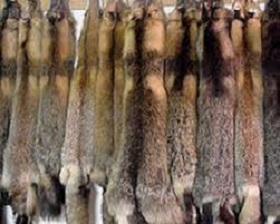Estonia, Markets and Companies
International Internet Magazine. Baltic States news & analytics
Friday, 26.04.2024, 17:44
Estonia: Fur farmers disapprove discussion of industry ban
 Print version
Print version |
|---|
The environmental committee of the parliament is to discuss
at its meeting on Jan. 15 the prohibition of breeding and rearing of fur
animals despite the clear resistance of the Ministry of Rural
Affairs, University of Life Sciences, Ministry of the Environment and
many other professional associations in the fields of entrepreneurship and
agriculture, spokespeople for fur breeders' overarching bodies told.
Fur breeders also pointed out the argument presented by
those endorsing the ban, which argues that due to health reasons it is advised
people refrain from wearing garments made of fur, thus, further development of
fur industry in Estonia is unwarranted. Initiators of the bill aim to
adopt it before the general elections, in which case the law would enter into
force on June 1. "This is yet another attempt -- the previous one was
rejected by the Riigikogu in May 10, 2017 -- to end an area of activity that
has been around in Estonia for 150 years and move jobs and investments out of
the state by 2025," spokespeople for the industry said.
In the explanatory remarks accompanying the draft, the
initiators of the bill have on several occasions presented incorrect
information, as well as deliberately confused wild animals with fur-bearing
animals bred in farms, spokespeople said.
"False claims have been presented regarding the use of
dangerous chemicals in the processing of fur, as well as pollution, trends in
clothing and fashion industries, the background of prohibiting fur farming
in different states and interpretation of research findings," head of
Estonian Fur Breeders' Association Leander Pragi said. "The myths
spearing in social media -- the explanatory remarks referred to social
media as their main source -- cannot be blamed on fur breeders. Strict
procedure is ensured in fur farms and all norms are observed that were
established in the law that entered into force at the start of 2017. No
violations have been recorded in the past two years."
Spokespeople for the industry said that all animals reared
at fur farms are looked after with care and the strict rules imposed by the law
are being adhered to.
All chemicals and processed used in the processing of fur in
the European Union are in compliance with the REACH regulation and do not pose
any threat to people, unlike what was stated in the false claims presented to
the public, industry spokespeople said, adding that the processing of fur
yields no microplastic residuals, which are the by-product of producing fake
fur and other clothing made of petrochemical materials, whereas fur
products last for generations and degrade fully and organically.
"Instead of the populism that surged before the
Riigikogu elections, we call for a serious and honest discussion of rural
development and analysis of the fur industry's potential for development
in Estonia. It is one of the view areas in agriculture in which we have a
certain climatic advantage compared to the southern states," the
spokespeople said
Fur farmers also argue that the bill includes
inconsistencies as the Animal Protection Act only lists three categories
of animals -- farm animals, pet animals and experimental animals. "It
remains unclear where the bill's initiators' logic stems from and how it should
be implemented in real life. Our position is that the initiators should first
and foremost make clear to themselves, their supporters and the wider
public the meaning of the terms 'farm animal', 'wild animal', 'fur animal',
'leather' and 'fur,'" spokespeople for the industry said.








 «The Baltic Course» Is Sold and Stays in Business!
«The Baltic Course» Is Sold and Stays in Business!

